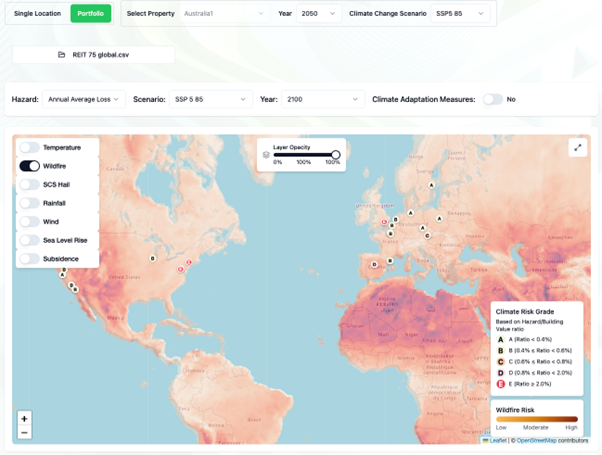Climate Change: (Still) An Inconvenient Truth
Climate change is happening, and happening quicker than anyone had predicted. The question is, ‘how prepared is your business?’
It’s 19 years since Al Gore featured in David Guggenheim’s 2006 documentary film ‘An Inconvenient Truth’. The film was a landmark in highlighting the widespread scientific consensus around the cause and potential consequences of climate change. From rising sea levels, to extreme weather and major ecological disruption, it helped raise the alarm bells that our anthropogenic impacts (driven largely by the continued release of greenhouse gases over the last 150 years) are very real and likely to get worse – a point proven since the film was made.
In 2006 the average global temperature at the time was 0.8°C above the pre-industrial average. In January 2025 this year, the global average was 1.75°C above the pre-industrial average – this represents more than a doubling of the global temperature anomaly in less than 20 years.
Beyond the continued record-breaking statistics though, it is the increasing impact of physical events with clear climate attribution that are more concerning. A quick summary of three notable events in the last 12 months highlights the increasing influence of a warming climate. The Palisades and Eaton fires in California (January 2025) are estimated to have an insured loss totalling over $30 billion USD. The World Weather Attribution team at Imperial College London estimate that climate change contributed to making the LA fires 35% more likely due to average temperatures at the time being 1.3°C warmer.
Similarly, the devastating floods that hit Valencia in late 2024 are very likely to have been exacerbated by climate change. While it is not unusual to have a cut-off low pressure system persisting over an area for several days bring rainfall, climate change is expected to make such heavy downpours more intense, given that for every 1°C you heat the atmosphere, it can hold 7% more moisture.
Likewise, last year’s Hurricane Milton in Florida bore witness to the increasing influence of climate attribution as the event was estimated to have resulted in 30% more rainfall due to climate change. Overall, global weather-related losses were responsible for 93% of overall losses in 2024 – with extreme wind, flood, wildfires, severe thunderstorms and increasing temperature extremes being the primary drivers.
Regulatory revolution
One of the positive risk management narratives since 2006 in the battle against climate change has been the steady progression of climate change being at the forefront of new laws, business strategy and firmly on the desks of company C-suite. Global regulatory requirements for large companies to submit climate-related disclosures have been steadily building around the world. Despite climate change occasionally being dragged into the politics of those with an anti-ESG narrative, it seems that industry leaders remain undeterred in their climate commitments. A recent PwC report showed that 84% of companies were standing by their climate commitments.
While the UK led the way in 2018 with the creation of the Task Force on Climate-related Financial Disclosures (TCFD), other countries are rapidly following suit with Europe’s new Corporate Sustainability Reporting Directive (CSRD) coming into being in January 2025. Similarly, despite the US’ SEC deciding to drop its defence of the final rules of climate related disclosures (April 2025), the eight circuit could still rule on the challenges and may uphold all or some of the disclosure requirements. Further afield, in Australia, Canada, and India, it is the globally recognised IFRS S2 reporting requirements from the International Sustainability Standards Board (ISSB) that are pushing global climate related disclosures and standards.
100-year River Flood, Gdansk, Poland
A platform for climate transition
Our focus at TransZero is to help businesses, investors, and asset owners understand how their global property portfolio may be impacted in a future climate. In turn, our physical risk report and platform support climate-related disclosure submissions. Through analysis of eight different climate perils, our cloud hosted platform analyses weather-related loss from wind, river flood, extreme rainfall, sea level rise, fire, extreme temperature, hail and subsidence).
With an interactive dashboard that accesses output of 149 loss and hazard metrics for every asset analysed, TransZero provides a detailed property climate risk assessment. Based on the latest data from global climate models and extreme hazard modelling, climate results present the full range of uncertainty in future risk.
Transzero platform helps businesses understand how their property assets will be impacted in the future
The TransZero platform canvasses well over 20 million data points in every analysis, with alternative Green House Gas (GHG) emission scenarios and time horizons presented based on the standard scenarios of the Intergovernmental Panel on Climate Change (IPCC) Social Pathways (SSPs) to support your climate related disclosures.
100-year Extra-Tropical Cyclone wind risk map, Europe. Warmer colours (red, yellow) show highest expected return period wind speeds (m/s)
Modelling your climate transition
Increasingly, companies also see how climate risk modelling allows them to more proactively manage their assets; identifying accumulations of assets in increasingly hazardous regions, whilst also seeing where climate change could be an investment opportunity. Our Path2Zero tool allows users to model the return on investment as they invest in climate adaptation to build more resilient properties.
TransZero’s Path2Zero tool allows return-on-investment (ROI) modelling to assess the financial benefits of improved climate resilience
19 years on from ‘An Inconvenient Truth’, it’s clear the climate crisis continues to become more urgent. While we continue to see devastating climate events, recent years have seen a dramatic increase in the collective actions of regulators, scientists, decision makers and support services helping companies navigate what is a complex risk landscape. Through data-driven approaches focused on solid risk management and adaptation, we can ensure that the net zero transition bring a sustainable future for all.
Transzero are a team of dedicated climate risk specialists, helping businesses understand how climate risk will impact their business. If you’re interested to learn more about the Transzero’s climate risk services, please contact info@transzero.co.uk
© 2025 TransZero Ltd





